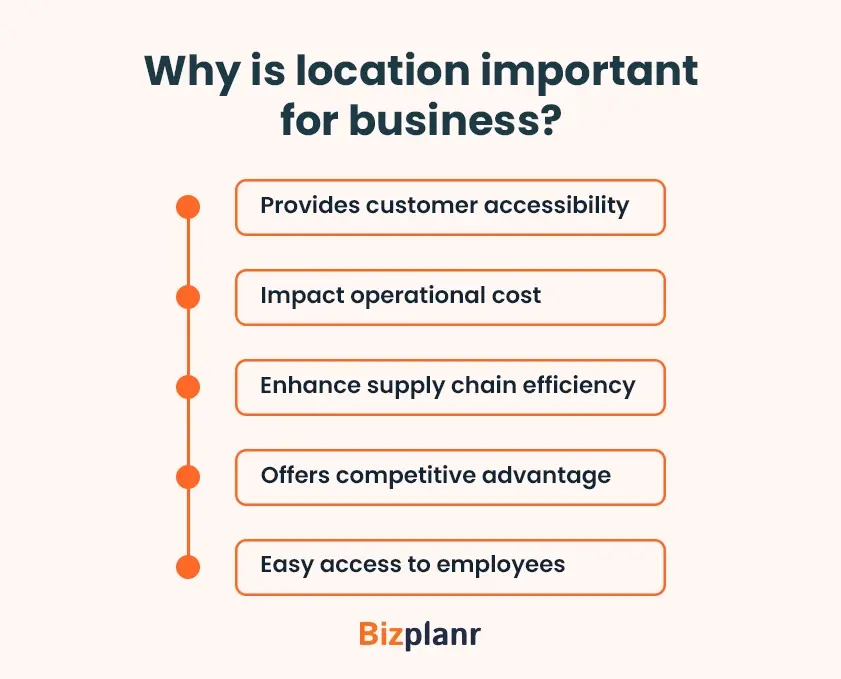If you’re looking to expand your business or looking for a new space to start one, choosing the right location is crucial. That’s because it directly impacts your customer accessibility, operational efficiency, and overall business growth.
But how do you choose the best location? Or how do you know if it's right for your business? Worry not; a solid business location strategy can guide you.
In this blog, we'll explore what a business location strategy is and how it can help your business grow. Let's dive in!
What is a business location strategy?
A business location strategy is a plan that helps businesses choose the right location for their operations to achieve their desired goals and objectives.
It involves analyzing customer proximity, competition, accessibility, costs, and market trends.
A business location strategy assesses these factors and enables you to select a location that will boost your chances of success and is aligned with your business objectives.
Why is location important for business?
Here are several key reasons why choosing the right location is essential for business:
Provides customer accessibility
A well-chosen location enhances visibility and accessibility for customers. Being situated in high-traffic areas or near your target market increases foot traffic and customer engagement, leading to higher sales and brand loyalty.
According to a report, 55% of U.K. consumers avoid purchasing if they encounter accessibility issues. This shows that when customers find it difficult to access a store, they’re less likely to complete the transaction.
Impact operational cost
The rent, utilities, and other operational expenses can vary significantly by location. Selecting a site that balances affordability with strategic advantages can help maximize your budget for other critical business areas.
A proper business location with strategic advantages helps you save your budget on:
- Taxes
- Staff
- Rent
- Utilities
- Marketing
- Traveling
Enhance supply chain efficiency
Being close to suppliers and raw materials can streamline logistics, reduce transportation costs, and improve inventory management.
Further, easy proximity to suppliers and transport hubs smoother operations and enhances collaboration and efficiency.
A smooth and easy supply chain provides benefits such as:
- Timely delivery of goods
- Elevate operational efficiency
- Enhance productivity
- Steady production
- Quick transportation of material
Offers competitive advantage
An optimal location for your business is vital to staying ahead of the competition. Being close to competitors can attract customers by offering alternatives in the same area.
On the other hand, positioning far from competitors can help you dominate a market by being the primary option in that location. Setting up business in a primary and good location benefits your business with:
- Reduction in direct competition
- Increased customer loyalty
- Good profit margin
- Brand recognition
- High visibility
Easy access to employees
A good location significantly affects your ability to attract and retain employees by making their daily commute more convenient. If the commute is hassle-free, employees are likely to join and stay with a company.
Further, in many organizations, easy employee access is prioritized in the site selection process. Easy access to employees through the right location will help your business with:
- Elevating loyalty
- Increasing employee retention
- Minimizing commute time
- Opening doors to a larger pool of job applicants
- Reducing struggles, ultimately enhancing productivity
Key factors to consider when selecting a business location
A good location strategy is designed to help businesses choose the right location. Here are a few factors to consider in your company’s location strategy:
| Factor | Why It Matters | Best for These Types of Businesses |
|---|---|---|
| Customer Accessibility | Increases foot traffic and sales potential | Retail stores, restaurants, and service providers |
| Competition | Can either attract shared traffic or avoid rivalry | E-commerce platforms, restaurants, IT hubs, and cafes |
| Cost and Overhead | Affects profitability and cash flow | Startups, local businesses, and franchises |
| Foot Traffic | Boosts visibility and customer engagement | Retail shops, food trucks, and gyms |
| Zoning and Regulations | Ensures legal operation and compliance | Restaurants, salons, and manufacturing units |
| Workforce Availability | Affects hiring and employee retention | Tech companies, call centers, and warehouses |
| Proximity to Suppliers | Lowers transportation costs and ensures timely delivery | Manufacturing, distribution, and retail |
| Safety and Crime Rates | Attracts customers as it’s a safe zone and protects assets | Grocery stores, cafes, and daycares |
| Growth Potential | Accommodates business expansion in the future | Franchises, tech startups, and service businesses |
| Proximity to Key Amenities | Improves convenience and business partnerships | Office spaces, coworking spaces, and cafes |
1) Customer accessibility
An optimal location keeps you connected with your targeted audience. Hence, it’s important to select an ideal business location that maximizes your audience's accessibility and engagement.
An ideal location helps you understand your customers' demographics, preferences, and needs. Starbucks is a prime example. Using location analysis, the company carefully researches potential locations before opening new stores.
2) Competition
Understanding the competitive landscape is crucial when selecting a location. However, it depends upon your business type. A retail business will likely have less competition to attract more customers.
Manufacturing companies or IT hubs may benefit from being near competitors to gain insights into business trends, market gaps, and customer bases.
Therefore, aligning your business type with the right location is essential to maximize success and avoid potential challenges.
3) Cost and overhead
Cost and overhead are critical factors when selecting a business location. They directly affect profitability and cash flow, so it’s essential to evaluate all expenses associated with each potential site.
Here are a few key considerations to evaluate:
- Determine if the rental prices fit within your budget.
- Research average utility costs (electricity, water, gas) for each location.
- Understand the tax implications of each location.
- Research about the cost of insurance as it varies based on location.
- Consider the condition of the property.
4) Foot traffic
Foot traffic is crucial, especially for businesses that rely on in-person customers, such as brick-and-mortar retail shops, restaurants, or service providers.
High foot traffic can significantly boost visibility and sales, so it's important to choose a location where people are likely to pass by and visit your business.
5) Zoning and regulations
When conducting a business location analysis, many businesses overlook the critical factors of zoning and local regulations.
Local laws dictate what types of businesses can operate in specific areas, so ensuring your chosen location complies with these regulations is essential.
Therefore a careful consideration of zoning and local regulations ensures your business operates smoothly without legal obstacles.
6) Workflow availability and proximity to supplier
The prime factor to consider while selecting a location, especially an office space, is workforce availability (talent supply). Being in an area with a strong talent pool ensures you can attract and retain skilled employees.
Additionally, your business's exact location impacts operational efficiency. For example, proximity to suppliers reduces transportation costs and improves supply chain management, ensuring timely deliveries and minimizing delays.
7) Safety and crime rate
Considering safety and the crime rate is a principal factor when developing a comprehensive location strategy. A safe area not only attracts customers but also helps retain employees. High crime rates can deter foot traffic, increase insurance costs, and put your business at risk.
8) Growth potential and access to key amenities
When carrying out site selection, consider its potential for future growth. A location with room for expansion allows your business to scale as needed.
Access to key amenities like transportation, restaurants, enough parking, and other conveniences can improve employee satisfaction and attract more customers.
A solid location strategy includes choosing a location supporting current needs and long-term growth.
Types of business locations: Which one is right for you?
When considering the types of business locations, it's essential to understand the different options available and how they align with your business model.
Here’s an overview of various business location types and their suitability:
| Business Type | Ideal Location Type | Key Benefits & Challenges |
|---|---|---|
| Freelancers/Consultants | Home-Based Business | Benefits: Low overhead, flexible schedule. Challenges: Limited professional meeting space. |
| Small Startups | New location/local market | Benefits: It's cost-effective and easy to set up. Challenges: It lacks scalability, has higher initial operational costs, and lacks business visibility. |
| Retail Shops/Restaurants | Retail Storefront | Benefits: High visibility access to foot traffic. Challenges: Higher rent, intense local competition. |
| Professional Services | Commercial Office Space | Benefits: Professional image, ideal for team collaboration. Challenges: Higher lease costs and utilities. |
| Tech Firms/Corporate Offices | Commercial Office Space | Benefits: Room for expansion, structured environment. Challenges: High setup and operating costs. |
| Manufacturing/Logistics | Industrial/Warehouse Space | Benefits: Ample space for production and storage. Challenges: Distant from commercial areas, higher maintenance. |
| Startups/Freelancers | Co-Working Spaces | Benefits: Networking opportunities, flexible leases. Challenges: Lack of privacy and limited long-term scalability. |
| E-Commerce Businesses | Warehouse or Home-Based | Benefits: Low overhead (home-based), space for inventory (warehouse). Challenges: Complex logistics and inventory management. |
Examples of business location strategies
Here are two examples that help you understand the importance of the right business location to achieve your desired business goal:
Example 1
Company name: Amazon
Location: USA
Amazon management strategically selected locations for its fulfillment centers to optimize delivery times and reduce shipping costs. Amazon can quickly reach a vast customer base by placing these centers near major urban areas. For instance, its fulfillment center in Staten Island, New York, efficiently serves millions of customers in the Northeast. This strategic location has significantly increased sales by enhancing customer satisfaction with faster delivery options.
Example 2
Company name: Starbucks
Location: USA
Howard Schultz, the former CEO of Starbucks, emphasized the importance of foot traffic in selecting store locations. Starbucks often opens its cafes in high-traffic areas, such as city centers, near universities, or busy shopping districts. For example, a Starbucks store located on the corner of a popular street in downtown Seattle attracts a steady stream of customers throughout the day. This strategic positioning increases footfall and boosts sales, making Starbucks a go-to destination for coffee lovers.
Conclusion
We hope this guide has equipped you to choose the right location for your business. In this article, we explore a business location strategy and how to select prime locations for your venture.
We also explored various types of business locations and provided examples to illustrate their effectiveness.
Remember, a well-crafted business location strategy is a critical component of a comprehensive business plan. The location you choose can directly impact your business success.
Hence, if you’re starting a new business or want to redevelop your existing business with proper business planning, you can use Bizplanr, our AI business plan generator platform.
It simplifies the business planning process, allowing you to generate a comprehensive business plan in just a few minutes, so you can concentrate on other business aspects and achieve your desired goal effectively.
Get Your Business Plan Ready In Minutes
Answer a few questions, and AI will generate a detailed business plan.
Frequently Asked Questions
What are the four strategic location considerations?
The four key considerations are customer accessibility, cost and overhead, competition, and local regulations. Each factor influences how effectively a business can serve its target market and maintain profitability.
How do zoning laws impact location decisions?
Zoning laws dictate what types of businesses can operate in specific areas. They can limit or allow certain activities, affecting your choice of location based on compliance requirements and the potential for future growth.
How does competition affect my business location decision?
Understanding the competitive landscape helps determine whether to position your business close to competitors for increased foot traffic or further away to establish a unique presence. Evaluating their strengths and weaknesses can inform your strategic choice.
What are the common mistakes businesses make when selecting a location?
Common mistakes include not researching local demographics, ignoring foot traffic patterns, underestimating costs, and failing to consider future growth potential. These oversights can hinder a business's success.
Can a business change its location strategy over time?
Yes, businesses can adapt their location strategy as market conditions change, customer preferences evolve, or as they expand. Reevaluating the location strategy periodically can help align it with current business goals.
How do online businesses approach location strategy?
Online businesses typically focus on logistical considerations such as warehousing and distribution centers rather than a storefront location. They analyze proximity to suppliers and shipping routes to optimize delivery efficiency and reduce costs.






